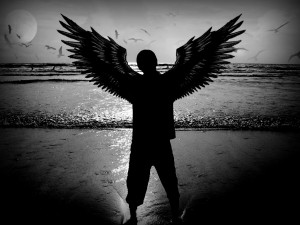No matter if you write political thrillers, historical dramas, or speculative fiction, a certain amount of research is required for the  reader to buy into your creation. Oftentimes we focus on researching hard facts, bits of information to inform the details that lend an air of credibility to our stories. There is one area of study I think is critical for anyone who writes fiction, but it isn’t something that you can read about in a textbook (at least not in any meaningful way), and that is emotion. More specifically, our own emotions.
reader to buy into your creation. Oftentimes we focus on researching hard facts, bits of information to inform the details that lend an air of credibility to our stories. There is one area of study I think is critical for anyone who writes fiction, but it isn’t something that you can read about in a textbook (at least not in any meaningful way), and that is emotion. More specifically, our own emotions.
Recently I canceled my cable TV subscription and opted to use just Netflix instead. One of the shows it recommended was an anime show called Elfen Lied. It was pretty highly rated and I was in the mood for something different, so I gave it a shot.
I was not prepared. Few artistic works have affected me as much as that show. It’s an uncompromisingly brutal and oftentimes disturbing story of a girl on a quest for redemption and the reclamation of childhood’s lost innocence (warning: I said brutal and I meant it. It’s not for the squeamish or faint of heart). But more important than the darkness of the story is its contrast to the moment it all leads up to, when redemption and forgiveness are achieved, when the veil of suffering is lifted to reveal love and hope. Never was such a destination so hard won, by the main character or by myself. It was devastating yet beautiful. It broke my heart.
Would that my own writing had that effect on people, which got me thinking: how was this able to affect me so? I realized that by introspecting my own emotional reaction to the show, I would able to determine what about it caused that reaction, and thus be able to use what I learned about myself as a tool in my own writing. I’ve done similar things in the past, but that’s been more looking at things that I thought could affect people emotionally, rather than looking at the raw emotions as they occur in myself. It’s always been a roundabout or subconscious approach, never direct.
In a book on fiction writing, I remember the author at multiple points recounting how he couldn’t finish watching a movie or reading a book (or some such) because it was too emotionally intense. I have never understood that. One thing art does well is convey emotion-so wouldn’t we, as writers, want to learn what we can of it? Experience and know the full spectrum of emotion, so that we can then imbue our works with emotional impact? After all, shouldn’t we be willing to suffer for our art?
Emotions are incredibly powerful, perhaps one of the more powerful forces in our lives; they can make our writing powerful, too. Being intimately familiar with them can allow us to implement them. From now on, I’m going to make an effort to embrace each emotional experience as it comes my way so as to better understand it. Hopefully I won’t become a neurotic in the process.
I’m always on the lookout for things that stir the emotions, so if you’ve got something that has done so for you, let us know in the comments! (And don’t mention Disney/Pixar’s Up. I’m already aware of its soul-crushing sadness-making ability)

 There are many parts of creating a new novel, and creating realistic characters is probably one of the most challenging ones. Characters need to be believable. They need to have their own personality, habits, and traits that set them apart from others. If done correctly, the reader will be able to relate. They’ll understand and feel concerned. It’ll pull them deeper into the novel and they’ll keep reading to figure out what will happen. If done poorly, it will throw them out of the novel. They won’t be able to believe and before long, they’ll look elsewhere and leave your novel behind.
There are many parts of creating a new novel, and creating realistic characters is probably one of the most challenging ones. Characters need to be believable. They need to have their own personality, habits, and traits that set them apart from others. If done correctly, the reader will be able to relate. They’ll understand and feel concerned. It’ll pull them deeper into the novel and they’ll keep reading to figure out what will happen. If done poorly, it will throw them out of the novel. They won’t be able to believe and before long, they’ll look elsewhere and leave your novel behind.